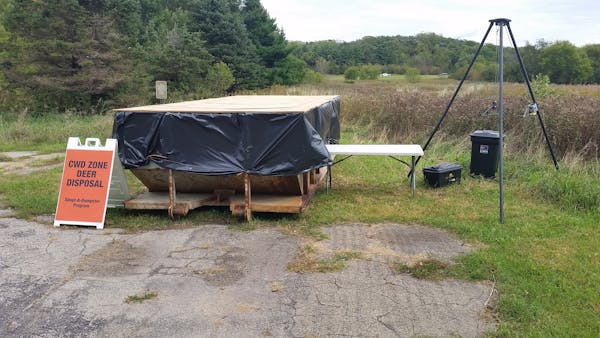Hunters who bag a deer after the start of firearm season this weekend will have a place to safely dispose of carcasses in areas of Minnesota at risk for chronic wasting disease (CWD).
The state Department of Natural Resources had rushed to get dumpsters installed last week after its expected supplier, Waste Management, backed out of the job. The dumpsters give hunters a new disposal option, since carcasses cannot be transported out of two CWD risk zones in central and southeastern Minnesota until they are tested for the disease.
The dumpsters allow the agency to ensure that remains are landfilled or incinerated, rather than left in the woods where the disease could spread.
Bryan Lueth, who is managing the dumpster program for the agency, said they ultimately found four haulers who would collectively provide 26 dumpsters in the two zones. The majority of those are in the southeast area.
"I'm feeling a lot better than I was a week ago," Lueth said. "We were really scrambling."
Waste Management's decision not to offer the service left state officials in a bind. The company, the nation's largest waste firm, also stopped accepting deer carcasses at its three landfills over concerns about CWD pathogens entering the water pumped out of the facilities.
Olmsted County also stopped accepting carcasses at its landfill, after wastewater officials in Rochester expressed concerns that its treatment plant could not eliminate those pathogens, known as prions, from the water collected from the landfill.
As a result, the carcasses in southeast will be taken to a landfill in La Crosse, Wis.
Carcasses in the central Minnesota zone will be burned in a special incinerator at the Crow Wing County landfill.
Lueth advised hunters to plan ahead for what they will do with the remains. All deer taken in the CWD zones must also be taken to specific locations for sampling, for example, which can be found online at tinyurl.com/CWDSampling.
Eric Roper • 612-673-1732 Twitter: @StribRoper

Want to share info with the Star Tribune? How to do it securely

'Safe recovery sites' would offer syringes, naloxone and more to people using drugs. The plan could be in peril.
New Minnesota GOP leaders seek peace with party's anti-establishment wing

Who is Republican Lisa Demuth, Minnesota's first House speaker of color?

